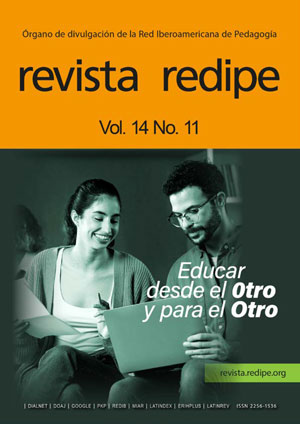Evaluación de un programa de formación docente en educación ambiental sobre conocimientos, actitudes y practices
##plugins.themes.bootstrap3.article.main##
Keywords
Formación docente, Educación ambiental, Investigación acción, Percepciones
Resumen
Este estudio evaluó el cambio en Conocimientos, Actitudes y Prácticas docente, a partir de un programa de formación docente en Educación Ambiental, implementado con 18 profesores de instituciones educativas en Florencia-Caquetá.
Se realizó un estudio mixto con un diseño cuasi experimental de tipo pretest–postest, complementado con análisis cualitativo. Los resultados cuantitativos evidenciaron mejoras significativas en Conocimientos y Prácticas, con tamaños de efecto grandes, mientras que en Actitudes el cambio fue positivo, pero no significativo. Cualitativamente, los participantes destacaron la pertinencia contextual del programa y la aplicabilidad de metodologías activas. Se identificó una correlación positiva entre el incremento de conocimientos y la implementación de prácticas pedagógicas ambientales. El estudio concluye que la formación docente contextualizada y basada en metodologías participativas favorece la apropiación de saberes y su transferencia al aula, aunque el fortalecimiento actitudinal requiere procesos más prolongados.
Referencias
Amézquita-Galindo, S. L., & Salgado, N. L. (2025). Assessment of teachers’ knowledge, attitudes, and practices in environmental education in a mediumsized Colombian city. Eurasia Journal of Mathematics, Science and Technology Education, 21(9), em2690. https://doi. org/10.29333/ejmste/16768
Amézquita-Galindo, S. L., & Losada-Salgado, N. (2025). Formación docente en Educación Ambiental: El aula, un territorio ambiental [Informe]. Zenodo. https://doi. org/10.5281/zenodo.17064119
Andrade, C. (2021). The Inconvenient Truth About Convenience and Purposive Samples. Indian Journal of Psychological Medicine, 43(1), 86–88. https://doi. org/10.1177/0253717620977000
ATLAS.ti Scientific Software Development GmbH. (2023). ATLAS.ti (Versión 25) [Computer software]. https://atlasti.com
Bamrara, A., & Bamrara, P. (2024). Environment Education Through Experiential Learning: A Case of Pauri Garhwal, Uttarakhand. In Teaching and Learning for a Sustainable Future: Innovative Strategies and Best Practices (pp. 129- 141). IGI Global Scientific Publishing. https://doi.org/10.4018/978-1-6684- 9859-0.ch007
Boeve-de Pauw, J., & Van Petegem, P. (2018). Eco-school evaluation beyond labels: The impact of environmental policy, didactics and nature at school on student outcomes. Environmental Education Research, 24(9), 1250-1267. https://doi. org/10.1080/13504622.2017.1307327
Boeve-de Pauw, J., Gericke, N., Olsson, D., & Berglund, T. (2015). The effectiveness of education for sustainable development. Sustainability, 7(11), 15693-15717. https://doi.org/10.3390/ su71115693
Bowling, A. M., Klooster, W., & Lindsey, A. J. (2024). Professional development sessions increased teacher knowledge and confidence to include agriculture in core curricular courses. Natural Sciences Education, 53(2), e20152. https://doi.org/10.1002/nse2.20152
Braun, V., & Clarke, V. (2006). Using thematic analysis in psychology. Qualitative research in psychology, 3(2), 77- 101. https://doi.org/https://doi. org/10.1191/1478088706qp063oa
Diez-Ojeda, M., Queiruga-Dios, M., & QueirugaDios, M. Á. (2025). Service-learning in environmental education of primary preservice teachers: Advancing SDGs and improving attitudes towards sustainable development. Education Sciences, 15(1), 98. https://doi. org/10.3390/educsci15010098
Dumrauf, A., & Cordero, S. (2020). Un enfoque participativo para la formación docente continua en la Educación en Ciencias Naturales, Ambiental y en Salud. Revista Eureka sobre Enseñanza y Divulgación de las Ciencias, 17(1), 160201-160215. https://doi.org/10.25267/Rev_Eureka_ ensen_divulg_cienc.2020.v17.i1.1602
Eliyawati, E., Widodo, A., Kaniawati, I., & Fujii, H. (2023). The Effectiveness of Teacher Training on Environmental Education: Challenges and Strategy for Future Training Program. Jurnal Penelitian Pendidikan IPA, 9(8), 6056-6066. https:// doi.org/10.29303/jppipa.v9i8.3153
Gómez, G. L. G. (2012). La enseñanza de las ciencias naturales y la educación ambiental en la escuela: realidades y desafíos. Praxis & Saber, 3(5), 9-14.
Hurtado Soler, A., Botella Nicolás, A. M., Fernández Maximiano, R., & Martínez Gallego, S. (2023). Development of Social and Environmental Competences of Teachers in Training Using Sound and Visual Landscape. Education Sciences, 13(6), 593. https://doi. org/10.3390/educsci13060593
Hyseni Spahiu, M., & Lindemann-Matthies, P. (2015). Effect of a toolkit and a oneday teacher education workshop on ESD teaching content and methods—A study from Kosovo. Sustainability, 7(7), 8051-8066. https://doi.org/10.3390/ su7078051
Kara, S., & Aslan, O. (2025). Innovative Evaluation of Pre-Service Science Teachers’ Nature of Science-Based Activity Practices and Their Integration with Science Subjects. Science & Education, 1-44. https://doi.org/10.1007/ s11191-025-00665-w
Kocak, E., Çelik, A. Y., & Uluyol, C. (2023). Pre-service Teachers’ Environmental Literacy: The Role of STEMbased environmental education with microcontrollers. Participatory Educational Research, 10(5), 233- 247. http://dx.doi.org/10.17275/ per.23.84.10.5
Kollmuss, A., & Agyeman, J. (2002). Mind the Gap: Why do people act environmentally and what are the barriers to pro-environmental behavior? Environmental Education Research, 8(3), 239–260. https://doi. org/10.1080/13504620220145401
Lopera Pérez, M., Rieckmann, M., & Marín Mejía, M. (2023). Educación ambiental y los Objetivos del Desarrollo Sostenible. Experiencia de formación de docentes en contextos rurales. Bio-grafía. Recuperado a partir de https://revistas. upn.edu.co/index.php/bio-grafia/article/ view/18258



